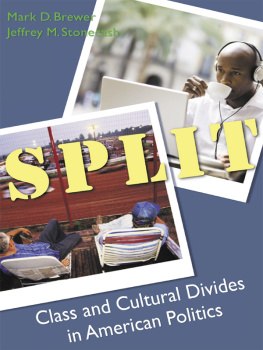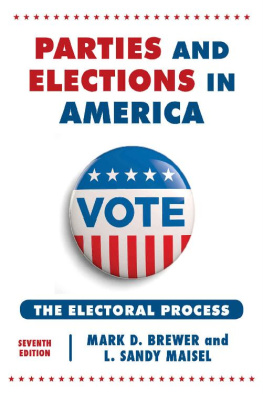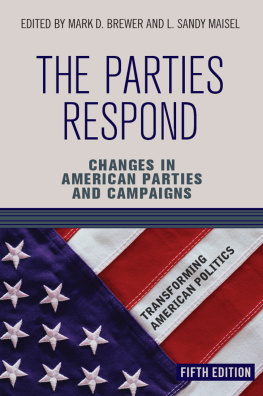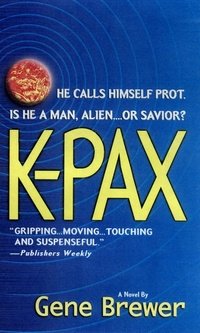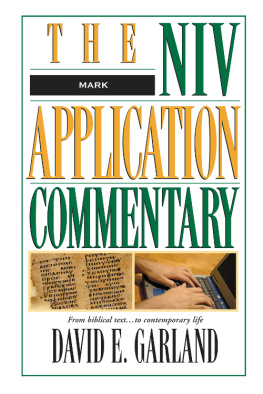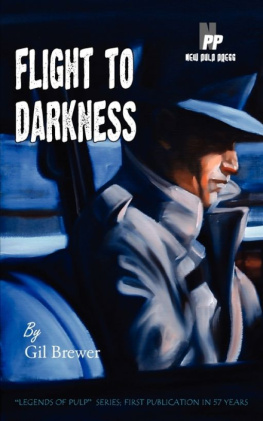CQ Press
1255 22nd Street, NW, Suite 400
Washington, DC 20037
Phone: 202-729-1900; toll-free, 1-866-4CQ-PRESS (1-866-427-7737)
Web: www.cqpress.com
Copyright 2007 by CQ Press, a Division of Congressional Quarterly Inc.
All rights reserved. No part of this publication may be reproduced or transmitted in any form or by any means, electronic or mechanical, including photocopy, recording, or any information storage and retrieval system, without permission in writing from the publisher.
Cover design: www.archeographics.com
Cover photos: Getty Images

The paper used in this publication exceeds the requirements of the American National Standard for Information SciencesPermanence of Paper for Printed Library Materials, ANSI Z39.48-1992.
Printed and bound in the United States of America
10 09 08 07 06 1 2 3 4 5
ISBN-10: 0-87289-298-0
ISBN-13: 978-0-87289-298-9
Library of Congress Cataloging-in-Publication Data
CONTENTS
CHAPTER 1
DIVISIONS IN AMERICAN POLITICS
CHAPTER 2
INEQUALITY AND OPPORTUNITY IN AMERICA: GROWING DIFFERENCES
CHAPTER 3
PARTIES AND POLICY PROPOSALS ON CLASS ISSUES
CHAPTER 4
CLASS DIVIDES IN THE AMERICAN PUBLIC
CHAPTER 5
THE RISE OF CULTURAL ISSUES: TRENDS AND DEVELOPMENTS IN AMERICAN SOCIETY
CHAPTER 6
PARTY AND POLICY PROPOSALS ON CULTURAL ISSUES
CHAPTER 7
CULTURAL DIVIDES IN THE AMERICAN PUBLIC
CHAPTER 8
THE DUAL DIVISIONS OF CLASS AND CULTURE
PREFACE
T alk of a culture warconflict over social and moral issuesis virtually inescapable in contemporary American society. The media is awash with references to the battles raging over cultural issues. Stories about conflict over abortion, same-sex marriage, and Gods proper place in public life saturate the printed pages, airwaves, and cable and broadband connections throughout America. It doesnt matter if ones taste in reading material runs more toward Readers Digest, Playboy, or the American Political Science Review, or if one is more likely to tune in to FOX News, CNN, or NPR. In recent years, discussions about cultural conflict are everywhere.
Agreements about the existence, nature, and impact of a culture war, however, are far less ubiquitous. Almost from the moment James Davison Hunter first introduced the idea of a culture war into scholarly debate in 1991, academics and other political observers have rushed to position themselves as proponents or skeptics of the existence of a moral battle raging within the United States. The only thing that is clear from all of these various contributions is that no consensus has emerged about the existence or impact of a cultural war.
Two recent books on politicsboth quite popular and influentialillustrate perfectly this lack of agreement. The first work, Culture War? The Myth of a Polarized America, by Morris P. Fiorina and his colleagues, argues that claims of a culture war in the United States are greatly exaggerated. For Fiorina, it is only political elites and a handful of activists at each end of the ideological spectrum who are really at odds over cultural issues. The vast majority of Americans are somewhere in the middle on cultural concerns, and largely in agreement with each other. To most Americans, talk of a culture war is inapplicable and irrelevant, Fiorina posits. Thomas Frank, the author of Whats the Matter with Kansas?, dramatically disagrees with such a perspective. For Frank, the culture war is a very real phenomenon within American society and is the driving force in contemporary politics. All Americans, from those in the highest public offices to the most average of citizens, fight over abortion, homosexuality, religion, and other cultural issues on a day-to-day basis. Perhaps most important, the culture war is swamping other issues. All other divisions in American society, especially class divisions, are overshadowed if not eliminated all together by the culture war. Frank is particularly agitated that less affluent Americans now regularly act contrary to their economic interests because of their conservative views on cultural issues.
This lack of agreement surrounding the existence and impact of a culture war is what initially led us to pursue this project. Fiorina and Frank could not both be right. But we also had a suspicion that both were not entirely wrong either. We knew through some of our previous research that contrary to the conventional wisdom, social class continues to affect Americans political behavior. Yet we also had conducted research that clearly indicated the growing impact of such cultural concerns as abortion and religiosity. Does one issue area trump another in the national consciousness? The purpose of Split is to determine the extent to which cultural issues and class concerns shape contemporary American politics. How significant are cultural and class conflicts in the United States and what is their relationship to each other?
The short answer is that class concerns and cultural issues both matter. Conflict occurs on both fronts, with neither cleavage overshadowing or displacing the other. For class concerns, the division is centered on issues of opportunity. Growing inequality in the United States has exacerbated differences in income in recent years. This has given new relevance to the old divide between the haves and the have-nots as differences in income create dramatically different opportunities in the areas of education, health care, housing, and overall quality of life. How, or even if, government should address these differences in opportunity is at the heart of class conflict. For cultural issues, the conflict is driven by different ideas of what constitutes appropriate behavior, different views of morality, and ultimately different views on right and wrong. Again, the proper role of government in settling these disputes is key to the cultural divide. Both cleavages involve issues of fundamental importance. Both are important to American citizens. Both shape our politics. We have two splits at work simultaneouslyone centered on class, and one centered on culture.
The question of class versus culture is often presented as an either/or situationone must displace the other. Such a presentation conflicts with reality, and we think it is important for Americans to understand that both sets of concerns are crucial to understanding our countrys politics. This understanding is particularly important for students taking political science and government courses across the nation. Split highlights many of the central topics and issues in introductory American government courses, as well as more focused courses on parties and elections, electoral behavior, public opinion, and other areas of American politics. We hope that students and instructors will find our examination of the class and cultural divisions in the United States informative and lively.
This book could not have happened without the assistance and support of a number of individuals and institutions. Mark Brewer would like to thank his colleagues in the Department of Political Science at the University of Maine for providing the supportive and collegial work environment in which this work came to fruition. He would also like to thank Courtney Hagenaars for his assistance with the references and his students in his courses on parties and elections and religion and politics for their often insightful discussions of many of the ideas examined in this book. Finally, he would like to thank his wonderful wife Tammy and beautiful daughter Megan for their love and support, and for understanding that sometimes Sundays are for writing. Jeff Stonecash would like to express his thanks for the wonderfully supportive environment of the Maxwell School.

 The paper used in this publication exceeds the requirements of the American National Standard for Information SciencesPermanence of Paper for Printed Library Materials, ANSI Z39.48-1992.
The paper used in this publication exceeds the requirements of the American National Standard for Information SciencesPermanence of Paper for Printed Library Materials, ANSI Z39.48-1992.
